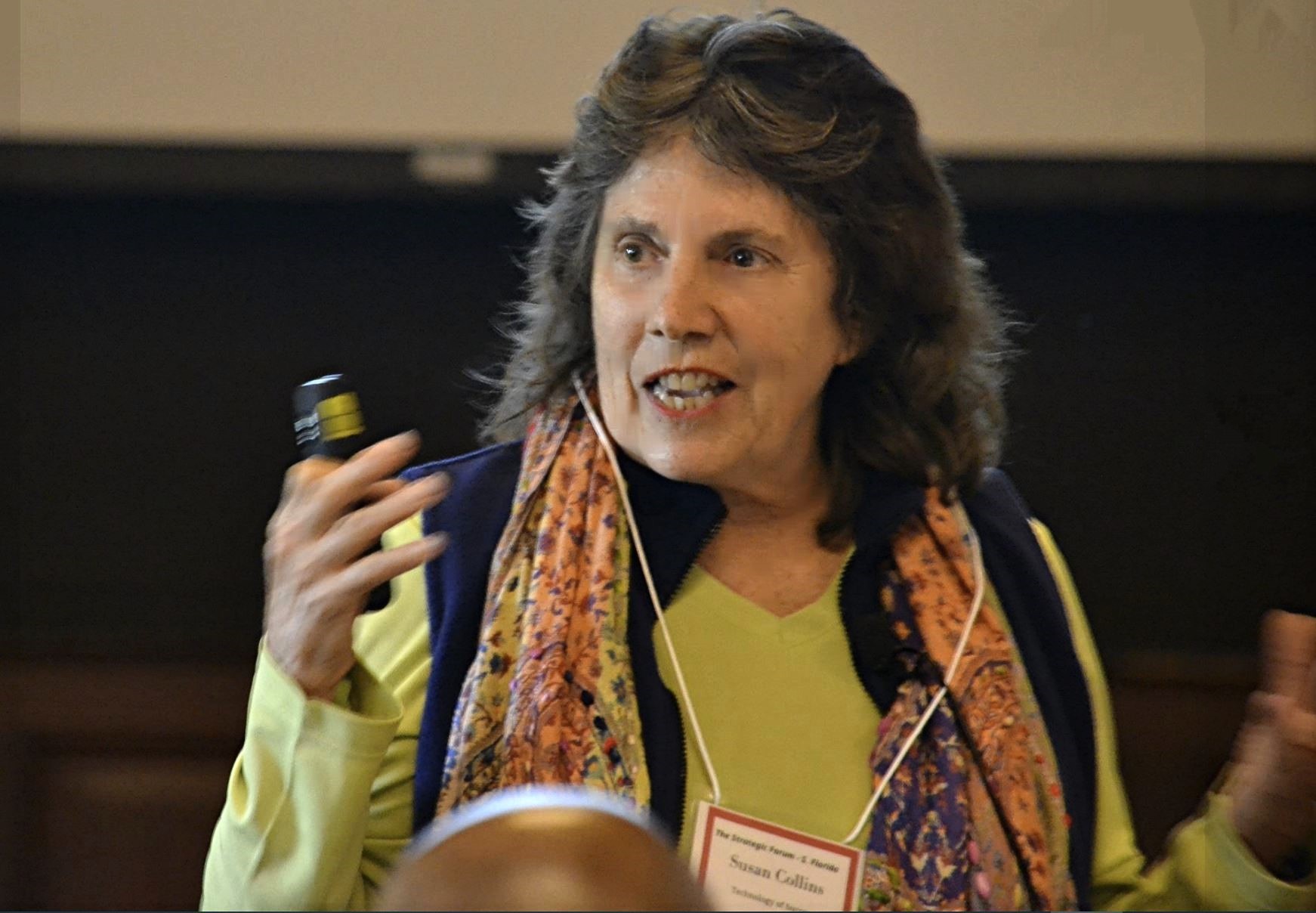Alright – so today we’ve got the honor of introducing you to Susan Ford Collins. We think you’ll enjoy our conversation, we’ve shared it below.
Susan Ford, we’re so excited for our community to get to know you and learn from your journey and the wisdom you’ve acquired over time. Let’s kick things off with a discussion on self-confidence and self-esteem. How did you develop yours?
Are HSPs* (Highly Successful People) Using Skills You’re Missing, or Misusing? Susan Ford Collins
It all began at the National Institutes of Health (NIH). My audience laughed when I presented my research idea to a room full of MDs and PhDs. And I had to decide … on the spot … whether they were right and I should abandon it. Or whether I was onto something BIG they just didn’t understand yet.
My colleagues’ laughter could have been the end of my dream, but it was just the beginning. In that life-changing moment, I committed to spend my career studying Highly Successful People (HSPs) to discover what skills they were using, and how to teach their skills to those who are missing, or misusing, one or more.
For the next 20 years I shadowed HSPs and identified 10 essential Success and Leadership Skills. Then, in 1985, I presented my first Technology of Success Training Program in Miami. And it took off!
Months later American Express called. “We don’t know what you taught our employees in your weekend public seminar, but whatever it was, we want you to teach it to the rest of our team in house.” Other companies called too … IBM, Florida Power & Light, Coopers & Lybrand, Ryder System, and the City of Miami. Within 10 years, I had facilitated over 3,000 training sessions, written the first two books in my Technology of Success Book Series, and CNN had called me, “America’s premier Success and Leadership Coach.
How? Let me backtrack a bit.
After graduating, I got married and we moved to Silver Springs, Maryland. My husband was a Clinical Psychologist at Walter Reed Military Medical Center, and I chose a position as a Research Psychologist at the National Institutes of Health (NIH).
NIH felt like the perfect place to begin my career. Why? Because despite having studied education and psychology, I did not feel ready to raise a successful child. My mother was an alcoholic. My father was a workaholic. And, I knew that, for better or worse, we unconsciously parent our kids the way our parents parented us, so
I hoped working at NIH would give me answers. But it didn’t.
After a year and a half, in the midst of my first pregnancy, a powerful realization started waking me at night. We were doing a great job of studying illness and dysfunction, but what more could we learn if we started studying healthy, successful people as well … top leaders and thinkers, top teachers and performers, outstanding creators and inventors?
Are HSPs using skills that other people aren’t? If so, how can we develop ways to teach them to individuals, teams, and families that are missing, or misusing, one or more?
Night after night the idea incubated in my brain and I started rehearsing how I would present it.
My heart was pounding and even though I was the newest researcher in the room, I thought my audience would be excited. But they weren’t. They laughed … not just a quiet chuckle but a full-throated Ha Ha Ha! I used to turn red when I was embarrassed so I probably did then, but red-faced or not, I had to make a life-changing decision … the type of decision you may have to make someday too!
Clearly my peers were more credentialed and experienced than I was, but were they right that my idea was laughable and I should abandon it? Or, was I onto something BIG they just didn’t understand yet? In that exposed moment, I committed to make this my life mission. And I’ve stayed on track ever since.
How did I start my research?
First, I made a list of HSPs and asked my colleagues to add names and make connections for me, and they did. Then, during a series of exploratory interviews, I encountered a problem. These men and women simply didn’t know what made them successful. They asked me to get back to them when I learned more. Why? They told me they were burdened by their success, by their responsibilities and long hours, by the difficult decisions they had to make on their own.
Unfortunately, they were using their success skills unconsciously so they couldn’t consciously pass them on to their families and teams. They couldn’t teach them. So I decided that I would need to shadow HSPs instead … to spend time with them one-to-one sitting in meetings, driving in cars, hanging out in offices, observing and listening until I could find the answers they couldn’t give me.
The road to success isn’t straight. It’s filled with zigzags, twists and turns.
My mission was clear and I was energized. Then, out of the blue, my husband received a job offer that was too good to refuse and we moved to Jenkintown, PA. With no research positions available and two young daughters to raise, I decided to accept a teaching position in their school so we would share the same hours and vacations. I was in charge of the Gifted Program. I spent my days with highly successful kids, and not so successful kids. And listening to parents who were feeling helpless and frustrated.
One evening I called a student’s mother who just kept insisting, “My Johnny’s a good boy. My Johnny’s a good boy.” But she didn’t know that her son was spending his lunch money on drugs. She didn’t know he was coming to my 8 am class high. She didn’t know he wasn’t paying attention and falling further and further behind in all his classes. Yes, from her point of view, her Johnny was a good and loving boy, but he was setting himself up for a very difficult life, and she couldn’t help him. And sadly neither could I at that point.
Later in my career I would discover how dire the consequences of not using all 10 skills really are. Like for an executive whose son started yelling at him on the phone (I could hear him across the room!) He’d promised his son he’d come to his championship basketball game that afternoon, but he’d bailed on him again because of a last minute meeting. “I hate you, Dad. You always put work ahead of me!“ And for the young director who couldn’t slow down and dropped dead in the parking lot early one Monday morning, leaving his wife and two kids alone. Keep in mind, the last Success Skill is Maintaining Your Health and Balance, the skill that ultimately makes all the difference. Experiences like these made me determined to get these 10 skills into businesses and schools, even pre-schools.
Then after years of counseling and trying, our marriage ended and, ready or not, I was a single mom.
Strangely, what had seemed like an off-course position led to my next defining step. One Monday morning, the principal of my school asked me to attend the World Game Conference at the University of Massachusetts. https://www.bfi.org/about-fuller/big-ideas/world-game/ He thought the experience would be valuable and it was … in ways neither of us anticipated!
Buckminster Fuller, one of the foremost architects of our time, organized World Game to bring top educators and innovators together to solve issues plaguing us here on Earth … food, water, housing, energy and pollution. Bucky imagined Earth as a spaceship and us as its crew in charge of solving vital issues.
I was eager to attend for another reason as well. Bucky was one of the people at the top of my HSPs List! One of the people I most wanted to shadow, but I hadn’t found a way to connect with him.
When I arrived at the conference and picked up my nametag, I literally bumped into Bucky in the hall! He was a short man so I suddenly found myself looking at the top of his shiny bald head. Thank heavens I had been laughed at at NIH. And that I had my outcome clearly in mind!
I quickly shook off my surprise and seized the opportunity. I told Bucky about my HSPs research at NIH and asked him, on the spot, if he would be willing to let me shadow him for several months.
Bucky chuckled for a moment and said, “I like you young woman, you’ve got spunk! I’m teaching at the University of Pennsylvania and you’re teaching in Jenkintown and there’s a train that runs between us, so we can make this work!” And we did.
After shadowing him for three months, we met again so I could tell him about the skills I’d seen him using. I spelled them out one by one. Bucky thought for a moment and responded, “Yes, Susan, I do all of those things. But doesn’t everyone?” And I said, No Bucky, that’s the point! Everyone doesn’t. And I would like to teach these skills to anyone who wants to learn them.
Over the next month, Bucky connected me with other HPSs he had in his Rolodex … old technology for contact list. He called them to say, “Letting Susan shadow you will be valuable. You’ll see.” And thanks to Bucky, after shadowing them, they introduced me to others who introduced me to others. Like a tree, my research grew and branched. And the Success Skills were becoming more and more clear.
Here’s something that “seemingly off-course” teaching job taught me:
When your outcome is clear and your intention is high, luck comes your way! And hands you your next step.
When my daughters were grown and heading for college, I moved to Miami and started pursuing my research full time. In 1985, I facilitated the first Technology of Success Training in Miami. And it took off! Then, when Hurricane Andrew blew apart my client’s businesses in1992, I had time to write.
In 1995, Our Children Are Watching: Ten Skills For Leading the Next Generation to Success was published. This is the book CEO’s begged me to write so that parents could model these skills for their kids at home. So teachers could reinforce them in school. And so, the next generation will already be using all ten when they enter the workplace … when they come to work for them!
Chinaberry Book Service: Our Children Are Watching Review
“This may just be one of the most important books you will ever read in your life, important for you and your children. I read hundreds of books every year and I can count on one hand how many books I have ever read that hold the potential to transform lives as deeply as this book does. It has the power to change your life forever if you are willing.”
After Our Children Are Watching was published, I spent two years touring the country, talking to PTA groups, to public and private school teachers and administrators, to local city governments and police. And I taught these skills to Montessori teachers at their teacher training center in Princeton, New Jersey, and spoke at their national conference in Philadelphia.
When I started my talk, I told everyone I was waiting for word that my daughter was in labor. Just as I finished the call came and with everyone cheering, I rushed to the airport to get home for my first granddaughter’s birth! And I made it.
What gave me the confidence and energy to keep going?
That’s simple! I started using the skills I was observing HSPs using. Their skills gave me the power I needed to stay on track! And let me see firsthand how well they worked!
Let’s preview three skills.
Skill One is Success Filing.
As I shadowed more and more HSPs, I noticed they had a habit. They set aside time each day to acknowledge themselves for the steps they were taking in the directions they wanted to go. Some wrote their successes on paper. Some wrote them in their computers or phones. Some simply took time each day to re-live and remember them in detail … to file them in their own brains.
But what is Success?
Contrary to what the dictionary says, HSPs told me success has three essential parts:
1- Success is Completion … Completion is Finishing plus Acknowledging (C=F+A)
You may have worked hard and done lots and lots of things, but if you don’t recognize what you’ve done as success, you won’t feel success-full.
Instead of waiting for others to acknowledge you, you need to take responsibility for acknowledging yourself! Because the truth is … your acknowledgment is more important than anybody else’s!
2- Success is Deletion … knowing when to say NO, when to make changes. Eliminating methods, relationships and goals that don’t work for you anymore. And …
3- Success is Creation … birthing new ideas and committing to take action to bring them into reality. And sharing them with others so they can co-create them.
The Bottom Line on Self-Confidence …
When your Success File is full, you feel Success-Full.
When it is low, you feel dependent and needy, wanting other people to tell you what to do, to praise you and reward you.
So, like HSPs, to keep going in the direction I wanted to go, I Success Filed each day before I went to sleep. I sat comfortably in my bed and mentally rewound my day. What did I do when I got up … and next and next?
What were my Completions? What were my Deletions? And what were my Creations?
You can Success File once a day or several times. It doesn’t matter. Just do it!
I Success Filed on good days and, more important, I Success Filed on bad days, days when I had setbacks and disappointments, days when I didn’t think I’d had any successes and I had to look hard.
Here’s what HSPs told me … Little Successes add up to the Big Ones. When they Success Filed their days, they included actions most people overlook, like eating a good breakfast, working out according to plan, spending time with family and friends, and stopping to buy groceries and gas.
A director at American Express said he got his promotion because he had written “buy gas” on his to-do list and he stopped and bought it. And the other candidate didn’t and he ran out of gas and missed the interview entirely! HSPs said it’s the little things that determine the quality of your life and relationships, especially with your spouse and kids.
Skill Two is Using the Right Gear … at the right time.
Like cars, Success and Leadership have gears and it’s essential to know when each one needed
The 1st Gear of Success is for starting anything new … a new skill, a new relationship or new job. Keywords include: safe/dangerous, right/wrong, good/bad, possible/impossible, have to/must, praise and permission.
The 2nd Gear of Success is for producing and competing. For earning money, winning prizes, promotions, and bonuses. Keywords include: more, better, faster cheaper. Sound familiar? Overusing Second Gear leads to burnout, accidents, illness, and even death like that young director!
The 3rd Gear of Success is for breaking through to new approaches. Keywords are: dream, create, innovate, co-dream and collaborate.
Each success gear has a corresponding leadership gear …
The 1st Gear of Leadership is for guiding someone who is just starting to learn, teaching them the rights/wrongs, goods/bads/ shoulds/shouldn’ts, have tos/ musts, possibles/impossibles of new skills, situations and relationships.
The 1st Leadership Gear requires you to slow down and put yourself in their shoes. To give them what they need so they can learn safely and correctly. And to provide a substitute leader … baby sitter, trainer or coach to meet their needs when you don’t have the skills or the time.
New learners need you to Success File for them at first, noticing improvement and saying, “That’s right”, ”That’s good” or “That’s better” to build and rebuild their self-confidence. New learners need you to give accurate feedback and suggestions as they try, try again. Then, little by little, you need to hand the Success Filing responsibility over to them so instead of remaining dependent on us, they become independent. Dependent on themselves.
Understanding your responsibilities as a leader …
The timing of your followers’ shift from 1st to 2nd Gear is up to you. You need to assess when they’ve learned the skills well enough to begin safely performing them on their own. Independently.
This is where leadership glitches frequently occur. An over-nervous, overly critical leader can try to keep someone in 1st Gear too long. Can try to keep them too restricted, too obedient and rule conforming, too loyal to you and your 1st Gear rules, curtailing their growth and interest. And creating resistance, rebellion and even avoidance of leaders.
Why is this shifting point so important for you to understand? Because as soon as they start performing their skills safely-correctly-consistently, they need to start testing the 1st Gear rules you’ve provided. Do they still need your “playpen” requirements? Or do they know enough to safely push your limits? The farthest point you go.
Pay attention!
The shift from the 2nd to the 3rd Gear of Success is quite different, and many leaders miss it. The timing of this shift is not up to you. It’s a shift your “once-followers” need to determine for themselves … when a new idea overtakes them in the night. Or an upset or failure suggests a better way, a more creative way. Or when luck steps in to assist them … like unexpectedly bumping into Bucky in the hall!
Now you need to allow your previously “new learner” or ”top performer” to take charge … unless you want them to leave your company, family, or organization and go elsewhere to bring their new idea into existence, to birth their new approach!
Now you need to follow their timing and needs. This is not your dream they’re pursuing. It‘s theirs! And you will either become a Co-Dreamer and support them the way they want to be supported, or you will be shut out. This is especially painful when it’s your child!
CEOs told me that understanding the success gears made leadership make sense. They asked me to teach The Technology of Success in their organizations. And I did.
“I learned more from Susan in a matter of hours than from all the management, leadership and team-building trainings I’ve taken in 18 years. And it works in my personal life too.”
—Carl J. Flood, VP Worldwide Management,
American Express
Success Skill Three: Mastering The Science of Dreaming
When I was at NIH, I discovered the work of Dr. Karl Pribram, a Stanford University neurosurgeon/neurophysiologist and Nobel Prize nominee who was actually able to measure the power of a thought!
Yes, you read that right! Some thoughts really are more powerful than others. Which ones, you ask? The ones that are more detailed and multi-sensory, the ones you can see, hear, feel, taste and smell. The ones you make time to pre-live.
Marketers use The Science of Dreaming to their advantage … but not always yours! By making ads and packages bright and colorful, by increasing the quantity and quality of details, by adding catchy jingles and repeating them over and over on TV, radio and the Internet, they program the details of their products in your brain … in your inner computer … so the next time you need toothpaste, like Colgate, or a cleaning product, like Tide, unless you’ve taken time to create other well-defined ideas, you’ll probably grab their product and head for the checkout to pay. Even though their product may not actually give you what you want.
Timing is everything … The day I spoke at The National Grant Management Association
When my book The Joy of Success was published in 2003, I was invited to give the keynote address at the National Grant Management Association Conference in Washington, DC. During my talk, I told the audience about being laughed at at NIH, not knowing who was there!
Afterward I was sitting at a table in the back of the room when I saw a group of people heading my way. They smiled warmly as they handed me their copies of The Joy of Success to sign. Then, like a chorus, they loudly proclaimed, “We are the team that decides on grants at NIH now. And we only wish we’d been there that day you were laughed at! We would have helped you get the research grant you needed!”
Unfortunately, their words came twenty years too late! I had already worked long and hard to fund the project myself.
“I have been reading books on success for over 30 years. The Joy of Success is one of the most sophisticated and useful ones I have ever read. I highly recommend it.”— Jack Canfield, coauthor of the Chicken Soup for the Soul Series.
A word to women leaders …
“Finally, a book about success written by a woman who has also raised children! Thank you, Susan, for illuminating a path to success that includes all of our potential—body, mind, and spirit.”— Christiane Northrup, M.D., author of Women’s Bodies, Women’s Wisdom
When The Joy of Success was published in Chinese, I was invited to teach The Technology of Success at the first Women’s Leadership Conference in Shanghai and again in Qingdao, China. I was also invited to teach at Smith College’s Redefining Success Women’s Leadership Conference and Florida International University’s PowerUp! Women’s Leadership Summit.
When your Success File is Full, you feel Success-Full. And when the Success Files of those you lead are FULL, you feel FUL-FILLED.
The Legacy Phase of Life
The Legacy Phase is no longer an age or a time. No longer about gray hair and retirement. It’s the state of mind and body we enjoy when we have enough time, energy and resources to be able to assist others, to mentor and support, to invest in startups and turn arounds, to fund them and serve on Boards. It’s a time to help residential high schools and colleges develop their land assets instead of selling them off. It’s a time to convert empty highrises close to transportation hubs into vertical cities with food, schools and health providers on site. To have solar panels on roofs.
It’s a state of mind and body many people never get to. A state of wellbeing.
Fortunately, more and more millennials are getting there now! They’re starting schools and businesses, They’re influencers and unicorns, they’re digital art collectors, owners of NFTs. They use AI, ChatGPT and NVIDIA. They’re introducing new and unheard of solutions here on Spaceship Earth. They’re breaking through to new ways of living cooperatively. Efficiently. Healthily. They’re so far out of the box that the box isn’t there anymore.
It’s a time of creativity and possibility. It’s a time when planes can parachute to earth instead of crashing. It’s a time of Crispr, new DNA research and other breakthrough medical technologies. A time when everyone can be fed and clothed. A time when we can grow sprouts in our kitchens and develop high-production greenhouses and vertical gardens in abandoned retail stores. It’s a time when we can work via zoom from anywhere, when my assistant, April Jhone Amoin, can live in the Philippines. A time when I can donate my photography to Fairchild Tropical Botanic Garden and instantly share it with you worldwide on flickr. https://www.flickr.com/photos/jungle_mama/
It’s a time when everyone everywhere can use all 10 Success Skills to maximize opportunity and joy. It’s time to dream dreams … and bring them into reality.
And it’s a time to Co- Dream and Collaborate.
Creating The Strategic Forum
I am a founding member of The Strategic Forum https://www.thestrategicforum.com/, a powerful group of top CEOs. Since our inception in 1999, we have met monthly in New York City and, since 2004, in South Florida as well. It’s an organization of entrepreneurs and business leaders. Of dreamers and developers.
We currently meet at Florida International University (FIU) to hear outstanding speakers and help each other make connections and seize opportunities. Before that we met at Nova Southeastern University (NSU). Student members attend our meetings and debrief with our speakers afterward so they can ask questions, make connections and find mentors. As a result, many students have found internships and opportunities. And we award scholarships each year.
The Way Ahead Collaborative
As I know all too well, great ideas require skillful, timely funding.
The Way Ahead Collaborative capitalizes and sponsors projects in housing, education, nutrition, art and culture. Our founder, Michael Browarnik, has founded and operated companies which invested and capitalized defining projects, including the development of Midtown Miami and the revitalization of the South Beach Art Deco District.
One of TWA’s pillars is getting The Technology of Success into schools and universities around the world. Dr. Jan Keating, TWA’s Chief Academic Officer and a member of our Advisory Board, used The Joy of Success book in her Leadership Course at the Stanford Online High School https://ohs.stanford.edu/. The student response was remarkable! If you’re interested, please let me know.
My dream has been a bold journey, and your dream can be too.
Don’t let others’ laughter stop you! Align with Co-Dreamers.
www.technologyofsuccess.com
www.susanfordcollins.com
Books by Susan Ford Collins …
Our Children Are Watching: 10 Skills for Leading the Next Generation to Success
The Joy of Success: 10 Essential Skills for Getting the Success You Want
Success Has Gears: Using the Right Gear at the Right Time in Business and Life
BLUR: Clear The Way Ahead … Even in the Worst of Times. Also available on Audible.
And Becoming One Again: Divorce, New Love and Life, a book of poems and drawings, is now available.
- Website: www.susanfordcollins.com or www.technologyofsuccess.com
- Instagram: susanfordcollins
- Facebook: susanfordcollins
- Linkedin: susanfordcollins
- Twitter: susanfordcollins
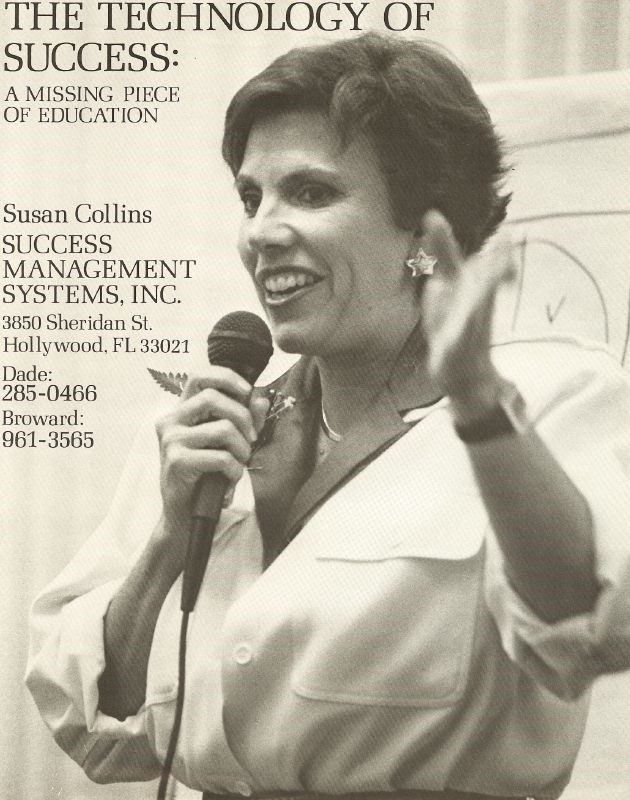
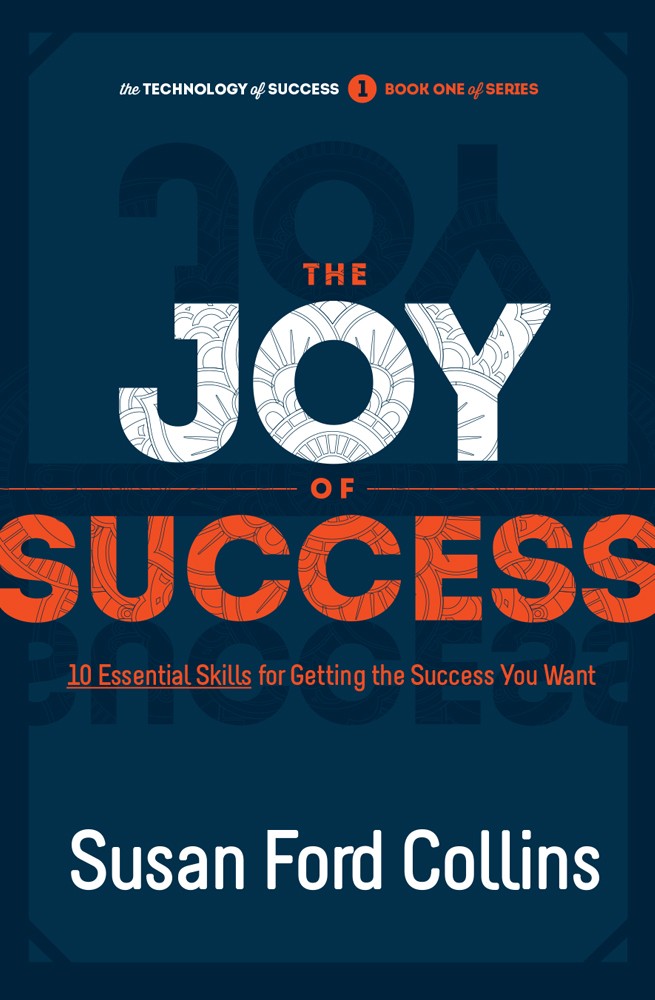
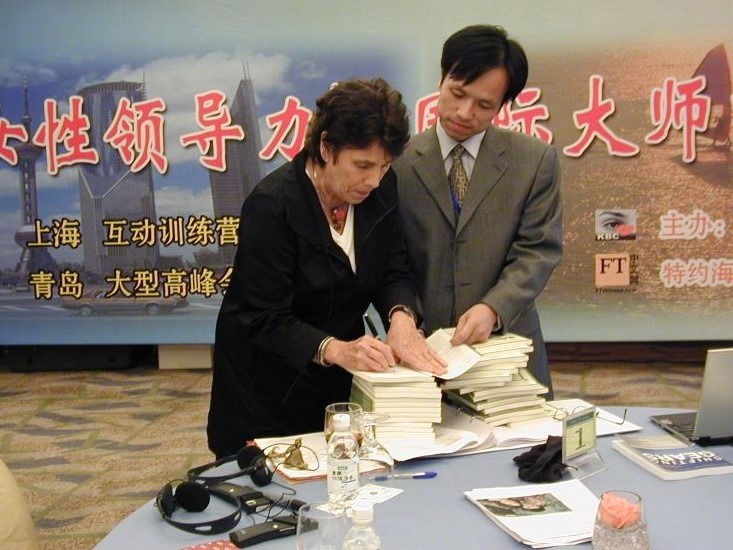
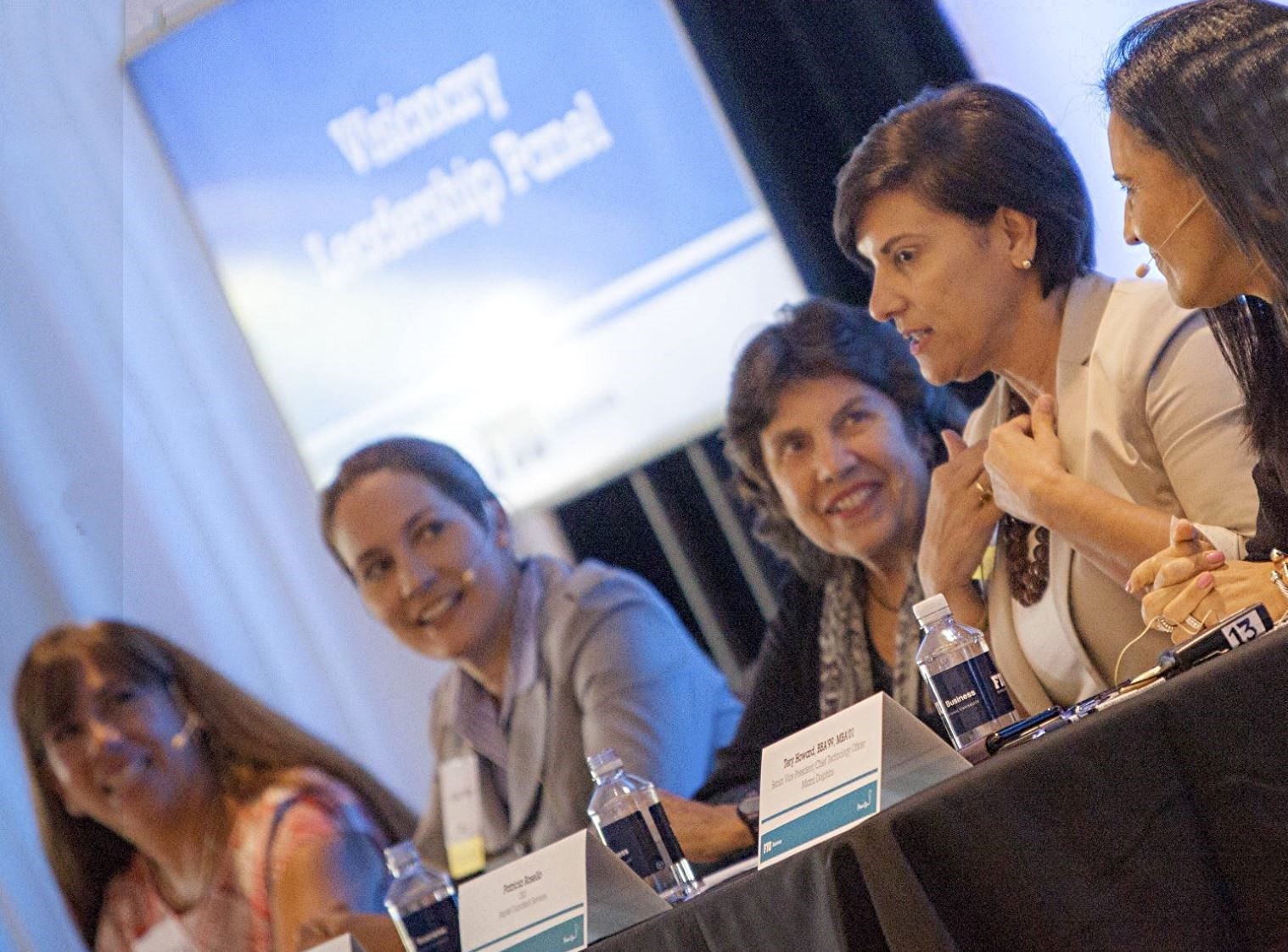
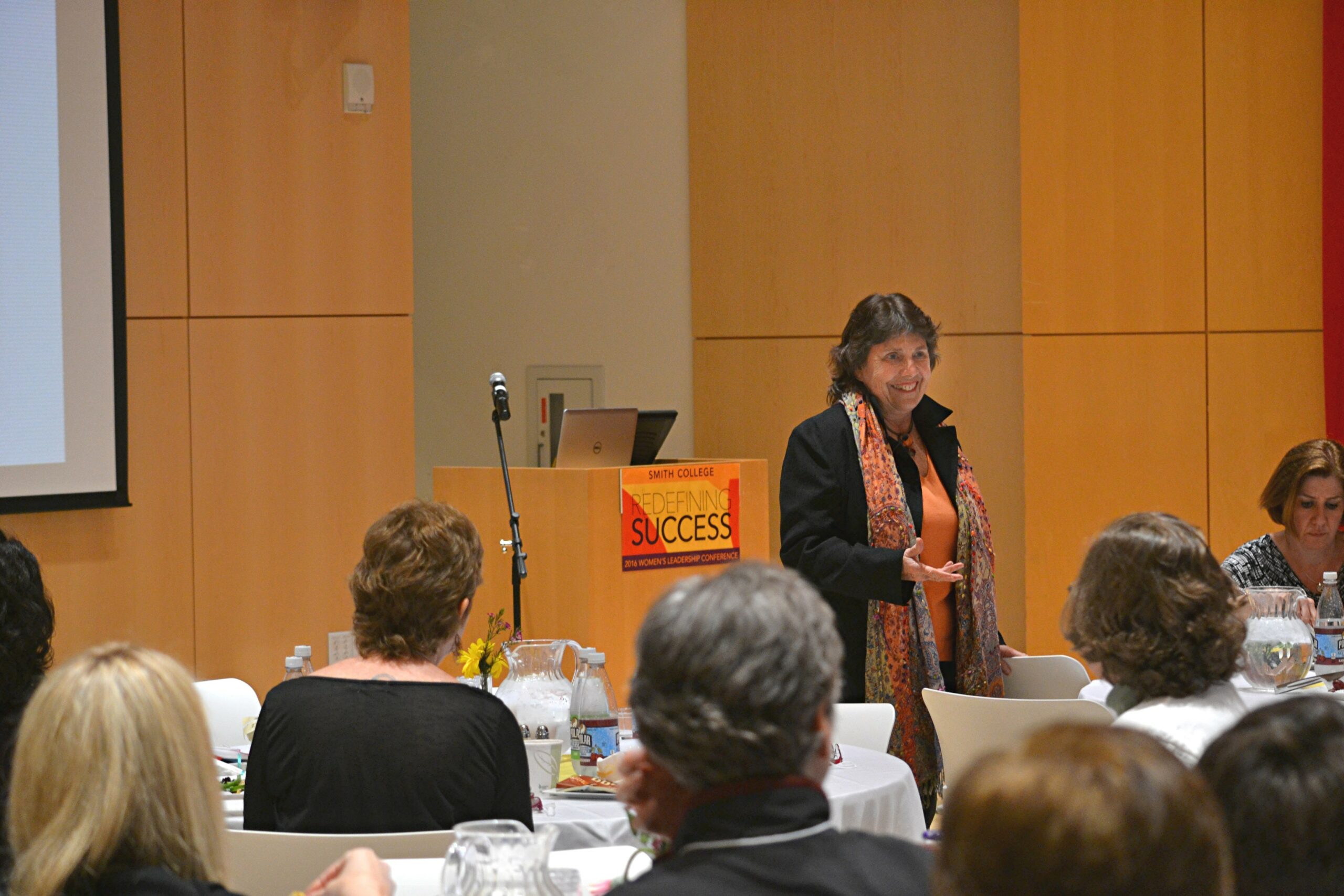
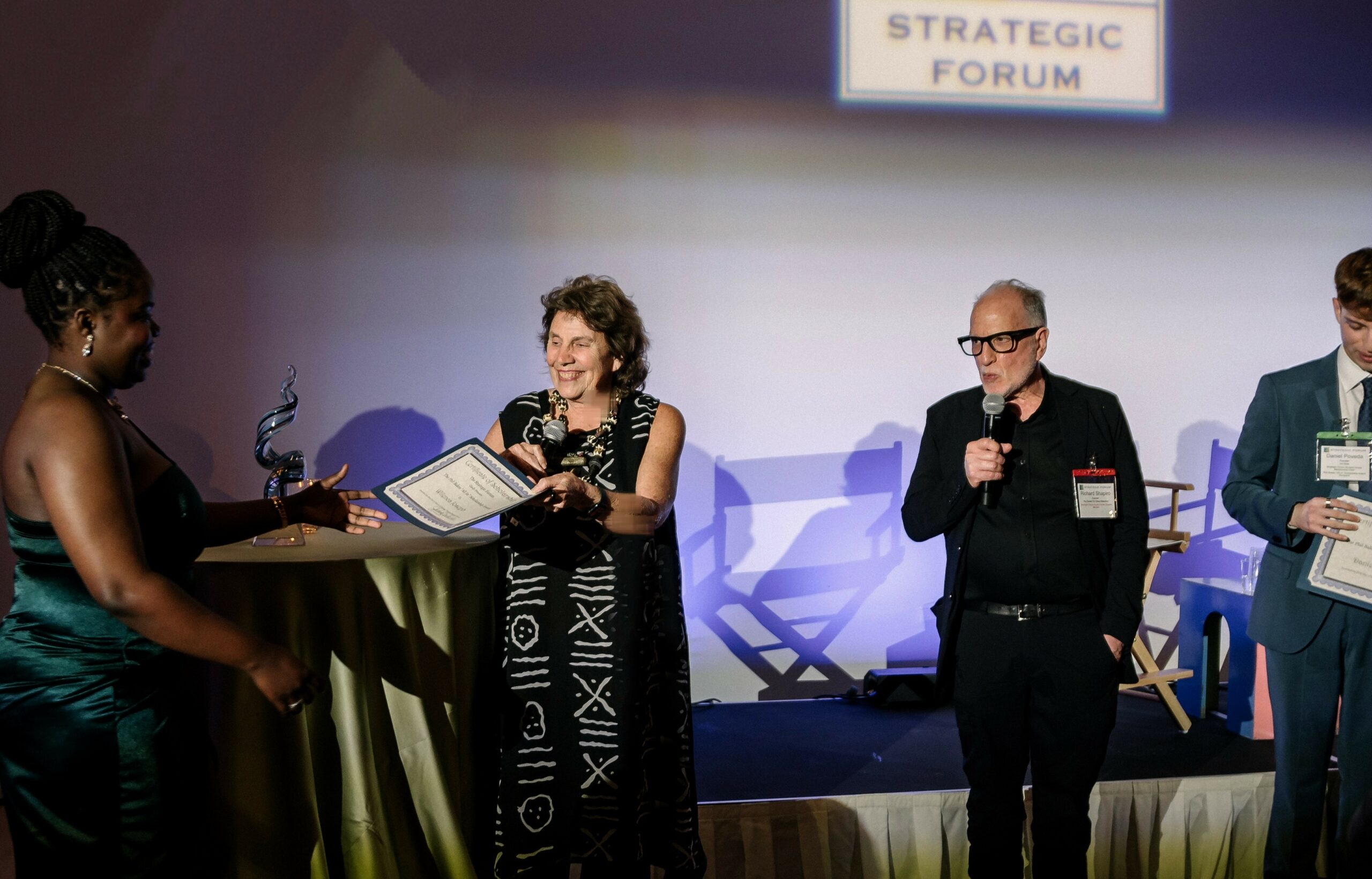
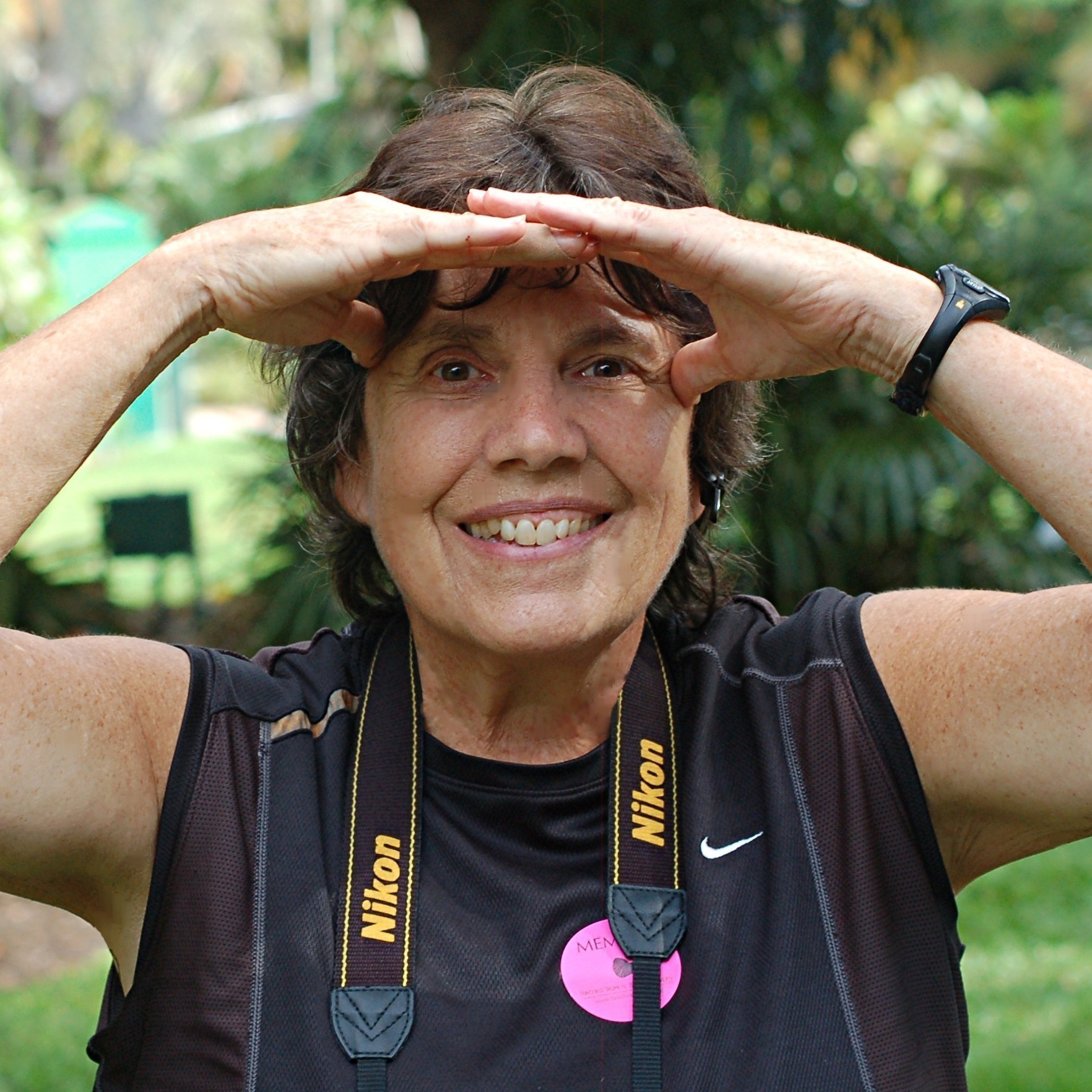

Image Credits
Picture #8 by Dmitry Zhitov

